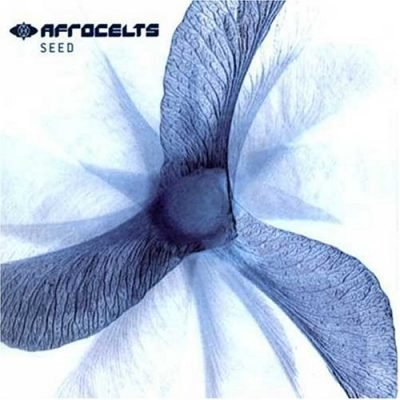Videos
Story
It was 1996 when Afro Celt Sound System first assaulted our senses with their innovative fusion of West African rhythms, Irish traditional music and cutting-edge dance grooves. Since then, there have been many lesser imitators and the global beat movement they pioneered has entered the mainstream.
Recorded and produced in their own studio in Islington (once owned by Pink Floyd), this is an album that marks a new departure for Afro Celt Sound System in a journey which began when they came together at a Real World recording week in 1995 to make their ground-breaking debut, Volume One: Sound Magic. More organic with greater emphasis on real instruments and songcraft and with less reliance on programmed beats and grooves than before, ‘Seed’, their fourth album, was released in 2003.
“When we started, what we did was a very radical idea,” said Simon Emmerson when “Seed” was released. “Now everyone’s using DJs and programmed loops and ethnic samples over the top. We’ve moved on and what you hear on this album is a product of all the years of playing live and interacting with each other as musicians.”
“We’ve found our own space and it’s almost like we’re starting again,” added co-producer and multi-instrumentalist, James McNally. “We made three sound system albums. This is the first fully-developed band album. It’s called ‘Seed’ because it really does feel like a new beginning. There’s no way we could have made a record like this when we started.”
Of course, ‘Seed’ contains much that will be familiar to Afro Celts fans. The core members remained remarkably constant – Simon Emmerson (guitars), James McNally (keyboards,piano, bodhran, bamboo flute), Iarla O Lionaird (vocals), Martin Russell (keyboards, programming & co-production), N’Faly Kouyate (vocals, kora, balafon), Myrdhin (harp), Moussa Sissokho (percussion), Johnny Kalsi (dhol drum, tabla), Mass (drum programming) and Emer Maycock (uilleann pipes).
The magical process of how the band’s three producers, James, Martin and Simon, work together is the key to what Afro Celts albums are about how they bounce ideas off of and inspire each other. With three people having to find a way to interplay and connect – sometimes disagreeing and deciding to leave a track on the shelf for at least the time-being it sets a standard much higher than that which could be achieved by any one musician producing alone. Its only after the triumvirate have set up the tracks that they call upon the spiritual and emotional impact that Iarla and N’Faly bring to their songs respectively, and upon the technical ability of Mass.
As the band grew, roles subtly shifted. Mass began to take over most of the drum programming, leaving Simon free to play more guitar, mandolin and bazouki. On the title track of ‘Seed’, he even played some classic, swamp-laden slide. Iarla continued to grow in stature as a lyricist of considerable depth and feeling. James’ reputation cemented as a tour de force both in song/tune composition and with his vocal and strings arrangements. The influence of N’Faly – ‘the Jimi Hendrix of the kora’, the band called him – became more significant as he contributed more to the singing and writing. The percussion loops of Johnny Kalsi gave way to live drumming, and the band decided quite early on in the recording process that they also wished to use a real bass on the majority of tracks, with guest players including the eminent Jah Wobble.
The result is an album that sounds more natural and organic than anything previously from the Afro Celts, with more emphasis on the playing and less on the programmed beats. Musically, it was also immediately obvious that Afro Celts were still boldly expanding their horizons. The West African and Irish influences were still the bedrock of the sound. Yet within “Seed’s” first three tracks, we hear such diverse new elements in the meltdown as a flamenco guitar and a Brazilian vocalist. ‘Seed’ also marked the emergence of Afro Celts as fully-formed songwriters.
Among the honorary Afro Celts adding to the rich tapestry on ‘Seed’ are Irish rocker Mundy, Ms Dynamite’s backing vocalists, the Brazilian singer Nina Miranda, the Canadian flamenco guitarist Jesse Cook and the virtuoso traditional fiddlers, Martin Hayes and Eileen Ivers.
Seed
Reviews
the Afro Celts leave the emphasis on programmed beats and grooves to their scores of imitators and capitalise on their stellar reputation as one of world musics-and, it must be said, the worlds-top live acts
Probably one of the albums of the year.
Songlines (UK)
‘Seed has a gentler laid-back feel, the soothing voice of sean nos singer Iarla O Lionaird as always an outstanding feature.’
What’s On (UK)
‘…a collection of tight, amazing epic workouts… the best record of their career so far.’
Classic Rock Society (UK)
Detroit News And Free Press, USA
“This 10-piece band continues to make hypnotizingly beautiful music that utilizes everything from traditional guitar, percussion and keyboards to uilleann pipes, kora and bodhran.’
…melodically wonderful, truly exemplifies the African/Celtic musical sympathy that was the original inspiration for Afro Celts.’
The Afro Celt Sound System returns after its hit album Volume 3: Further In Time with a new, simplified band name-Afro Celts-and a superb follow-up record. All 10 songs on the new disc are originals, and collectively, they exceed whatever expectations Further In Time may have fostered. Afro Celts have yet to create a full-length that didnt offer an essential track for dance fans, Seed delivers a trio of tunes destined for dance floors: “The Otherside,” “Rise Above It” (Featuring Eileen Ivers’ fiddle), and “Green Instrumental.” For a memorable encounter with uilleann pipes, cue up “Deep Channel” and catch Emer Mayock’s furious solo. In a more measured vein, Iarla O’Lionaird offers a beautiful vocal performance on “Ayub’s Song/As You Were,” a tune that, in addition to being melodically wonderful, truly exemplifies the African/Celtic musical sympathy that was the original inspiration for Afro Celts.’
Billboard (USA)
Arts
‘…a characteristically electric mixture of guest performances, from flamenco guitar to Nina Miranda’s deliciously cool neo-bossa vocals. The delicate instrumental interplay, though, is given space to be more than just contrast for the big beat.’
The Daily Telegraph (UK)
The Afro Celts finally sound like a fully fledged band rather than a clever studio project.
‘The Afro Celts finally sound like a fully fledged band rather than a clever studio project.’
The Times (UK)
‘The result is cohesive, classy and will satisfy die-hard fans
…as well as winning over a few cynics.’ ‘…the centrepiece of the album is Rise Above It, an epic track featuring the vocals of Irish rock singer Mundy, an amazing virtuoso fiddle performance by Eileen Ivers and a cacophonous finish with N’Faly Kouyate’s powerful African chants and Ms. Dynamite’s backing vocalists trading celebratory overtures.’
Hmv Choice (UK)
‘Global-beat pioneers Afro Celt Sound System change their name and go organic with this latest offering…they’re liberated from the domination of machine-defined programming and, brimming with new confidence…a whole new level of songwriting comes to the fore in the aptly-named Seed, burgeoning with new beginnings… It’s dreamily meditative, it’s sweepingly orchestral, it’s beaty and dancey…Synergistic blendings of slide guitar and uilleann pipes, kora and fiddle, jigs and jives burst out of the grooves in an unbelievable multi-layered swirl of sound…do your ears and preconceptions a favour and buy this album.’
Bbc Radio 2 Folk & Acoustic Reviews (UK Internet)
…the world-travelling outfit has undergone a revolution
…and forsaken sequencers and programmed beats for real playing, real instruments…years of touring has turned the Afro Celts into… a band. In the wall of sound, Iarla O’Lionaird’s voice remains astonishing.’
Scotland On Sunday (Scotland)


